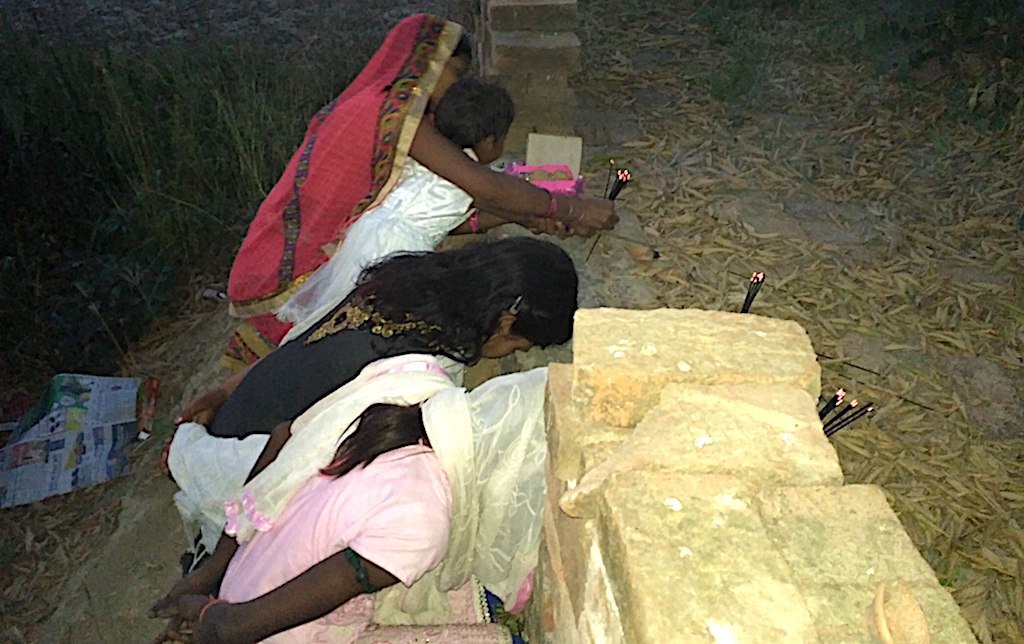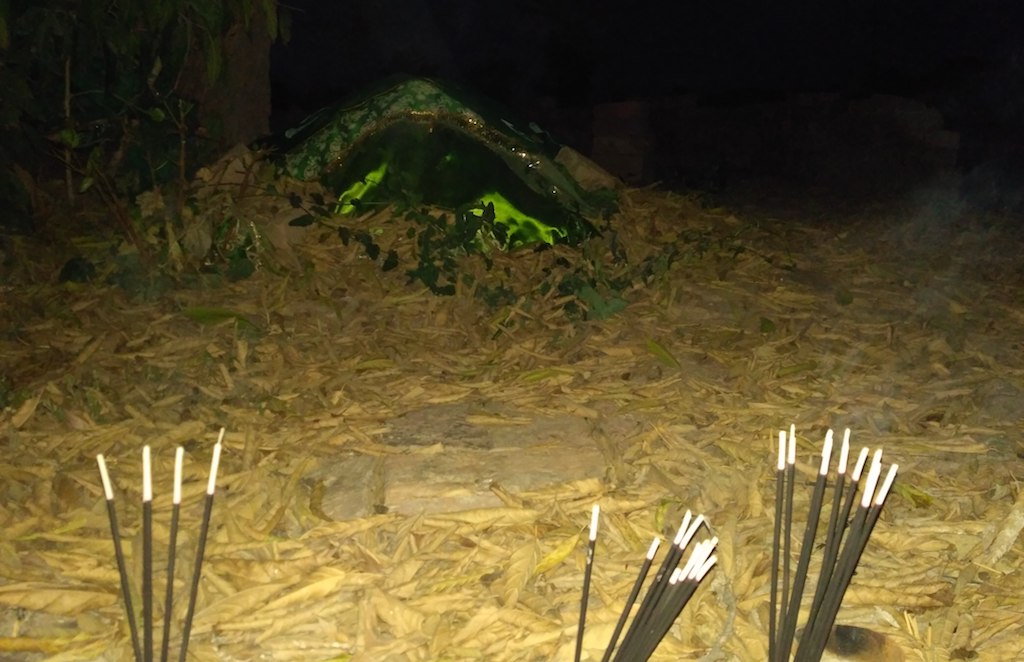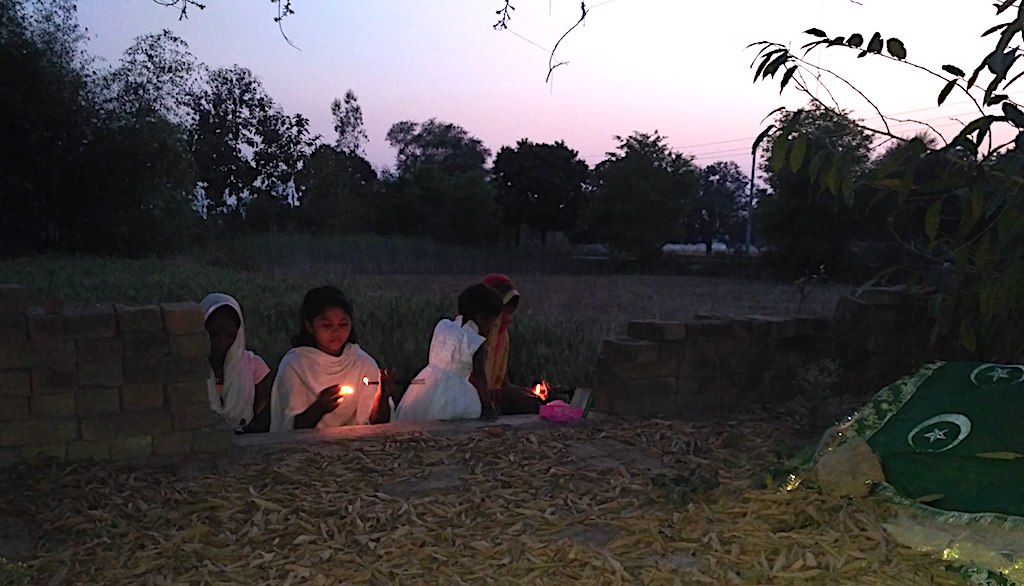Zeeshan Husain for BeyondHeadlines
As I sit on a partly broken dusty slab put on the side of a dirt road, a flycatcher garbs my attention. It is nose-diving for dinner perhaps. The overhead wire and the electric pole remain standstill. The sun has slowly gone down as if drowning in the green-brown fields of wheat. A gust of cool breeze makes its presence felt when it flutters the loose half sleeves of my shirt. A chimney is billowing black smoke at a distance on the right-hand side. There is a brick kiln perhaps. On my left, several men cross past riding their bicycles at a pace as if a boat is gliding on a motionless sea.
The gentle breeze over the wheat harvest tries to make an appealing motley of green and golden colours. Summer is knocking at the door. Flies and dust are circumambulating each other, everywhere. Everything is so idle as if even clocks don’t tick here. Suddenly Ajay, my friend, raises his index finger- “someone is coming”. A lady in a red saree, head partly covered, is slowly walking towards ‘Haji Baba’, along with a girl and a young boy. We immediately dash off towards Haji Baba, leaving indolence aside.
‘Haji Baba’ is one of the many small, unknown, perhaps even unmanned shrines which are dotted all over India. I am in a village in the poorvanchal area of Uttar Pradesh. Globally known for Hindu rituals and temples the world over, villages of poorvanchal have more beautiful and richer stories to tell than what is globally believed. Haji Baba, as it is popularly called here, is a very small shrine. It took us a while even to locate the extremely inconspicuous structure, just a hundred metres away from the village’s tar road whose sides have deteriorating asphalt.
In the farm of a Brahmin family, Haji Baba has been resting peacefully under a big tree for ages. Its foliage acting as a canopy for the mud-plastered grave. It is on a small mound, and the grave is covered by a green chadar with incantations in Arabic and prints of crescent moon and stars. People are not bothered too much about what is written there. Neither does anyone know when it was built? It has been for the villagers since time immemorial. What is the jurisdiction of Haji Baba’s blessing? ‘World’, comes the answer after much rumination. Haji Baba is spaceless, timeless, but never evokes awe in the villagers. For them, the shrine is like any other village structure. Apart from the big tree, no one cares about the shrine as such. Thursday evenings are unusual. Two or three families come here. During my visit, I saw a family and talked about their beliefs.

Rina is an 18 yr old girl and visiting the shrine with her sister-in-law. Rina is in a salwar suit while her bhabhi is wearing a red sari. Face covered, she maintains a coy body language: a sign of a newly married woman who has just joined her in-laws place. I follow them from the tar road to the dirt one. A strip of land which separates two different farms leads to the shrine. One has to take their slippers off before stepping into the field border- a narrow patch of land around a foot in breadth. The path is full of grass and broken at more than one place. One has to balance oneself, and I felt I was walking on a tight rope. On the left is the green wheat crop which flowing to the tunes of evening breeze. Mustard stubble is on the right and lies unmoved. In-between, some wild shrubs welcome new visitors by tickling their feet and calf.
Rina and her bhabhi manage well all such insignificant barriers for praying before Haji Baba. From the pink colour plastic bag, comes out two small packets of agarbattis and kachcha halwa. From respective packets, bundles of agarbattis are lit with matchsticks. One matchstick is sufficient to burn two bundles of incense sticks. In no time, a rich aroma fills the atmosphere. Both the bundles are carefully inserted on the mud floor of the shrine towards the side of the head of the grave. They bow their heads down in front of the agarbattis placed in a row. Time stops again. Except for the wisps of smoke from the incense sticks, nothing moves. All become fixed like a statue. A moment of spiritual peace descends on the small inconspicuous dusty grassy place. Flycatcher flits again.
I feel my heart’s pounding, and the rustle of the dry leaves fallen from the canopy protecting the baba for ages. Unlike the tree, leaves are not eternal. They die and fall. My foot moves a little, leaves rustle and I, again, become motionless. Three heads rise together; a peculiar synchrony is felt. The little kid is asked to offer a piece of halwa to Baba. He places it on the mud floor. Rest will be distributed among others. Bhabhi, being courteous, asks the kid to offer me “Prasad” (tabarruk). I relish a small bite.
“Aap log kyu aaye hai yahaan?” (why have you people come here?), I ask.
“Aastha hai,” (I have faith) Rina replies.
“Aur yeh aastha kyu hai? (why do you have this faith?)
Jo maango milta hai,” (We get whatever we wish for), Raveena replies.
I ask, “Aapne kabhi kuchh maanga hai?” (have you ever wished for something?)
Raveena answers, “Haan, achchhe number se paas hona.” (yes, that I get passed with good marks)
I ask, “Aur?” (And…?)
She replies, “Meri jaan bhi ek baar bachi thi.” (my life was saved once)
Raveena is smart enough to answer me in Hindi, after knowing my limited understanding of Bhojpuri. We have worn our sleepers again. Just few steps are left before our paths would diverge. I ask what I wanted to know most clearly. Aap log Hindu hai, aur Haji Baba Musalman. Fir bhi aap log aate hai? (You people are Hindus and Haji Baba is a Muslim. Still, you visit this place?)
Bhabhi replies, breaking her silence, “Arey matha tekne se kya hota hai? Bhagwan to ek hi hai. Dil se maango to…”(what happens in bowing the head? There is only one Lord. If one asks by pure heart then…)

Sun has set and it is slightly dark. Sky has turned from orange-red to black. The trio has left me and has moved quite ahead. My friend kept waiting for me all along. The flycatcher did not. I start walking towards the home, thoughtlessness takes over rambling. When I got back my senses, I realised why the silence was broken from behind the veil. In present troubled times, ‘great traditions’ has been overshadowed by animosity but ‘little traditions’ of communal harmony is still strong, to borrow concepts from the two anthropologists working on India, Milton Singer and McKim Marriot. Humanity is all about dil, pure heart. Haji Baba gave me this lesson, and I am happy to appreciate it now.
(Zeeshan Husain is a student of Uttar Pradesh society and politics.)









